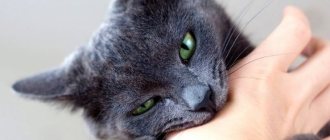6857Administration
The domestic cat differs from the wild one in having a more docile character. He easily makes contact with people and gladly allows himself to be taken care of. But sometimes it still shows a certain wildness in its behavior, which is expressed in the fact that the cat growls and hisses at the members of the family in which it lives. And if at first this behavior even slightly amuses some owners, then with regular and frequent manifestation of aggression in this way, any owner begins to think about its causes and possible consequences. Especially if there is a small child in the family.
Fear as a reason for growling
Hissing and growling associated with fear appears due to insufficient attention to the kitten. If the kitten rarely had contact with people, did not receive proper attention from them, or even suffered insults or even beatings from them, then fear of people will accompany an already adult cat. To understand that it was fear that caused the growling, pay attention to the following factors:
- a cat can rush at its owners in the presence of a certain stimulus, real or imaginary;
- if a pet is “cornered”, it hisses and growls much more intensely;
- aggression is accompanied by appropriate warning postures;
- the pet can connect its paw swings to the growl;
- when the situation comes to its logical end, the animal begins to relieve stress, for example, by licking the fur.
You cannot punish a cat for such behavior, since with such tactics it will always expect bad things from a person.
Hissing is inherent in this breed
Cats have lived alongside people for thousands of years. They are accustomed to communication and respond by meowing when a person addresses them. Hissing is also a way of communication. It can be a warning signal, an option for protection. In this case, the animal takes a tense pose, arches its back, ruffles its fur and presses its ears.
Memory of punishment
Cats have a good memory and remember punishment for a long time if it was severe. The owner scolded the animal, even hit him, and forgot about it a day later. The cat experienced a strong fright and retained memories of it. When approached or touched by the owner, she runs away, hides in a corner, makes threatening sounds, hisses and growls.
Owners should remember that it is forbidden to shout at furry animals and it is unacceptable to hit them. It is better to demonstrate offense and change the tone of your address. As a last resort, you can lightly hit it with a rolled-up newspaper. Cats are able to understand that the owner is dissatisfied with their behavior.
Surprise
Sometimes cats hiss because a person unexpectedly approaches them. They perceive this as danger, get scared and become aggressive. This can also happen when an animal is suddenly petted or picked up. Purrs are capricious and do not like it if something happens against their will. If a hissing cat begins to nervously twitch its tail, you need to retreat. Otherwise, everything will end in bites and scratches.
Stress
A cat that has experienced severe stress may suffer from depression for a long time. The animal becomes timid, does not tolerate touching and hisses to be left alone. Pets in this state feel vulnerable and react negatively even to affection.
Competition
Cats can hiss at all family members if they see a competitor in the house - another cat or dog. They deliberately scratch furniture, mark corners, and are capable of attacking people at any moment. Animals are constantly tense, overly aggressive, and sometimes refuse to eat.
Food protection
It's not just dogs who guard the food bowl. This is also true for cats. They can hiss, growl, and fight with anyone who comes close to the bowl. Some owners have the habit of hand-feeding their pets. You shouldn't do that. There is a risk that one day the cat will perceive the outstretched hand as an attempt to take food away and bite the palm.
Cats sometimes hiss because they are in severe pain. If the animal is lying down, trying to curl up, or rushing from side to side, the owner should be concerned. The cat may have been injured or suffering from some illness.
There are cats that hiss when they see strangers. This is a danger signal that they give to the owner. There are breeds that often hiss in the absence of good exercise. These are reed, Bengal, Siamese, Abyssinian, and Egyptian cats that need active games and prolonged movement.
We suggest you read: How many kittens and how long does a cat bear them? Important questions for the breeder: how long does a cat give birth for the first time and then what affects the number?
There are purrs that hiss when petted and scratched. They believe that this causes the fur coat to get dirty. Hairless cats hate being touched with cold hands, getting angry and hissing.
It happens that a hissing animal looks into emptiness. This causes confusion among the owners. The pet's behavior may be caused by the presence of other people's things, mice and insects in the house. In hot countries, cats hiss when approaching a snake's home. An irritated cat also often hisses at a person. The animal shows him that it is not in the mood. It's better not to touch.
In some cases, a cat hisses because it is inherent in its breed. Let's say Siamese hiss due to the inherent behavior of this type of temperament. Some active breeds start to hiss because they don't get enough exercise. These are Abyssinian, Oriental, Cornish Rex and some others.
Some furry breeds (Persians) hate it when they wash themselves and immediately start petting them. And there are hairless cats (Egyptian breed) - they hiss constantly, because hissing is part of their conversation, and does not necessarily mean aggression.
Frustration
Frustration is a state in which a pet's needs are not met. Scientists believe that this disorder occurs if the kitten is not weaned off cat milk naturally.
As a result, the cat is not able to get its own food. He expects some kind of reward and growls if he doesn't get it. How to recognize this reason:
- the cat hisses at the owner, even if he trusts him;
- the pet growls if in any situation he did not get the desired reward;
- the cat did not receive mother's milk;
- The cat screams loudly and rushes around the door.
This also manifests itself when the owner does not serve food quickly enough, opens the front door, or simply moves away from the pet.
Predator instinct
Everyone is familiar with the game when the owner plays with a kitten, moving his hand or foot under the blanket. It is at this moment that predatory behavior awakens. Only a person perceives this situation as a game, and the pet learns to hunt with all responsibility. This reason is easy to recognize:
- a cat attacks a person from an ambush;
- When you shout back at the cat, the pet begins to behave even more aggressively.
When this behavior goes too far, it becomes a problem.
INTERESTING TO KNOW: How to get rid of the smell of cat urine on the sofa
Possessive instinct
A cat's instinct of ownership is much stronger than a human's. A pet can growl if it wants to show itself as the master of the situation. Even if the animal is the only one in the house, it is driven by this instinct at the genetic level.
To understand that it is precisely this reason that provokes the growl, just look at the circumstances under which the pet growls.
If he protects food or a favorite toy, it means that the possessive instinct has begun to play in him. What to do in this situation? First, you need to move away from the cat to a safe distance, since growling and hissing are the last warning before an attack. The cat may bite or scratch you.
Territorial aggression
It occurs in both females and males upon the onset of puberty. A cat and its entire pride (people and other pets) have a certain smell and place in the hierarchy. If one of the members of the pack crosses the “permissible boundaries” or changes the smell, the former friend turns into a “stranger” who must leave the territory.
Attacks on the owner can be explained by competition for the place of alpha representative in the pack. A person has a personal scent - the smell of sweat, in men it is saturated with testosterone, in women with estrogen. The smell of sweat causes aggression in a cat due to the action of the sexual instinct; a cat attacks a man, a cat attacks a woman. If the animal and the owner are of different sexes, the smell of human sweat causes the opposite reaction - sexual arousal and the release of endorphins.
Protecting the territory is dictated by the instinct of reproduction, and aggression in a cat can only be removed by sterilizing the pet. Please note that the older the ward becomes, the weaker he considers himself, and the fear of being overthrown or expelled prompts the animal to become violently aggressive.
We suggest you read: Cardiomyopathy in cats symptoms ⋆ Heart Treatment
Being in a team
If a cat does not like to be in large crowds of people, play with children or roam from hand to hand, it is better to isolate it in the next room. Some animals simply cannot stand large companies and warn not to be touched by growling.
You should not pick up the animal, stroke it, or allow children to play with it, since the cat can also warn of an attack, and its hissing or growling can very soon turn into scratching.
Other reasons
The cause of aggressive behavior may well be pregnancy. This is a natural phenomenon; in nature, a pregnant cat always protects her unborn kittens. Try to let the animal know that it can trust you. Soon the cat will understand this and stop behaving aggressively. Inappropriate behavior may persist after the birth of the babies, but when the pet understands that the kittens are not in danger, the aggression will disappear.
Illness can also cause nervousness and aggression. When your pet is in pain, he doesn't want to be bothered. This is why a cat may hiss or growl when you pick it up. Don’t guess what disease has afflicted your pet; take him to the vet.
To understand what role illness plays in growling and sudden hissing, take a closer look at the cat’s behavior. He may be nervous, apathetic, eat and sleep poorly, lick his fur, or try to eliminate the cause of pain with his teeth.
Also sometimes the cat’s behavior after anesthesia is inappropriate. This is normal, since the pet does not perceive the surrounding reality for some time and is simply afraid of it. Try to calm the cat down, let him know that you are nearby, speak kind words and pet him.
INTERESTING TO LEARN: How to easily remove mats from a cat at home
As a way of protection
In this case, the pet clearly wants to be left alone. He is scared or upset. The best way to calm an aggressive cat is to let him sit quietly in his favorite corner. Attempts by the owner to pet, play or give a treat will be regarded by the pet as another encroachment on its safety. If your pet likes to rest in the closet, where the bottom shelf is covered with a soft blanket, then now is the time to let her do so.
The easiest way to recognize a scared cat is:
- She huddles to the floor or huddles in a corner.
- At the same time, the pupils are dilated.
- The cat hisses or growls, but makes no attempt to attack you.
- Ears flattened.
- The pet intimidates you, but looks around and tries to find shelter for itself.
We can conclude that the fluffy beauty is desperately afraid of something, so the cat behaves aggressively. What should the owner do? As mentioned above, let him be alone, in a closed and dark corner, on a soft and warm bedding. In some cases, the cat may roll over onto its back and fold its paws. It is very important to recognize this condition so as not to suffer yourself or harm your pet.
This applies mostly to uncastrated cats that are entering puberty. What to do if the cat becomes aggressive and bites? The recommendation is the same: pay close attention to your pet and try to understand what is happening to it. In young individuals, hormones are most often raging, and the aggression associated with dividing territory is very pronounced.
We suggest you familiarize yourself with: What is the name of the breed of cats similar to the Georgian. All cat breeds with photos
If a cat returns from a walk and shows fighting spirit, most likely he just got into a fight with a neighbor and is not yet cooled down from the fight. Your pet may just need these walks, where he can communicate with his own kind and try his hand at it. Often a cat changes behavior if a new relative appears in the yard.
There can be competition at home, too, if you get yourself a new pet. It doesn't matter if it's a puppy or a kitten. Animals react in a similar way to the appearance of a child, and aggression can be both direct and hidden. In one case, the pet arches its back, hisses and bites. In another, it may mark the territory occupied by the “occupier.”
Pet injures its own tail
Sometimes it happens that a cat bites its tail, and when trying to prevent it, it begins to hiss and growl. This is dangerous because in some cases this behavior leads to further tail amputation. There may be several reasons for this disorder:
- the owners moved to a new place of residence;
- a new resident has appeared in the family;
- they began to pay less attention to the cat;
- The pet has experienced psychological trauma.
Often a cat may chew its tail at night when all family members are sleeping.
How to respond to a growl
It is important to follow a list of rules that will allow you to pacify your pet and eliminate conflict:
- The cat's character is designed in such a way that you are unlikely to be able to pacify your pet right away. Wait a few minutes for the animal to calm down.
- When a certain amount of time has passed and the pet has completely calmed down, try to establish contact with him. Pet him, talk to him, give him a treat.
- If the reason is that the animal is in pain, take him to the vet immediately, as pain may indicate the severity of the disease.
It happens that a cat simply has an aggressive character, and nothing can be done about it. In this case, do not try to change your pet, but adapt to it. He loves you, he just can’t show it with affection and purring. Understand him and accept him for who he is.
How to stop an animal from growling
If growling and aggressive behavior are inherent in the character of a cat, then it is unlikely to be weaned from it. However, if the reason lies elsewhere, then it should simply be eliminated. If you cannot do this yourself, you need to seek help from a specialist.
Important: you should not shout at the cat or humiliate it, much less hit it; this may not have the effect you expect, and the pet will become even more aggressive.
What should you not do in the process of education?
In the process of upbringing, owners often make mistakes, reinforcing and encouraging unacceptable norms of behavior. This is due to insufficient knowledge of the psychology of cats and the principles of the formation of cause-and-effect relationships.
To wean a kitten from biting, you need to know what actions are prohibited during the raising process.
- Physical punishment. It reinforces aggressive behavior towards the owner and also contributes to the emergence of new behavioral problems.
- Unsystematic approach to education. A situation where sometimes biting is scolded and sometimes ignored will confuse the kitten. In this case, the learning process will be significantly more difficult and will take more time.
- Using physical pressure. If the kitten is afraid, do not force it to behave friendly. This will make the situation worse. Trying to forcefully overcome a kitten's fear will increase the animal's stress level.
Kitten growl
The case of the little kitten requires a separate description. The baby has to learn a lot of new things about the world around him, but for now he knows nothing and experiences a lot of emotions when looking at the surrounding reality.
Watch your baby, try to show him that you are there for him, that you support him in everything. Kittens can be afraid of the unknown, while hissing, growling and fluffing their tails. They may try to show themselves capable of attack or defense in order to be taken into account.
However, establish contact with the kitten gradually; you should not immediately shower it with great attention, this can lead to stress, as a result of which mental trauma will occur, and the baby will simply become even more aggressive. This may continue in the future, for life.
Thus, the growling of an animal is a common phenomenon that many owners encounter. Understand its reasons, and the cat will thank you with affection and devotion.
Why does a cat growl at someone else's kitten?
We have already figured out that an adult cat often growls at her own kittens. I wonder what happens when the kittens are strangers? It would seem that they need to share? Let's look at a number of factors for this manifestation:
- The cat growls at a strange kitten that appears nearby, thereby demonstrating that she is the main one in the house. At the same time, an adult cat is able to express its hostility to a newcomer not necessarily by growling and hissing; it is easily ready to paw at the face or bite.
- It is not uncommon for pets to immediately greet a young pet rather indifferently, literally ignoring him. However, as soon as the newcomer begins to approach the cat’s personal belongings (bed, bowl, toys, etc.), the animal becomes furious. And here teeth and claws, growls and hisses come into play. This method helps explain to the cat that it is better not to touch its belongings. It immediately becomes clear who is boss in the house.
- It must be said that a cat is a touchy and rather vulnerable creature. She does not accept that the owner brought a stranger into the home. In such a situation, the growling may be aimed not at the new kitten, but at showing others one’s own resentment.











